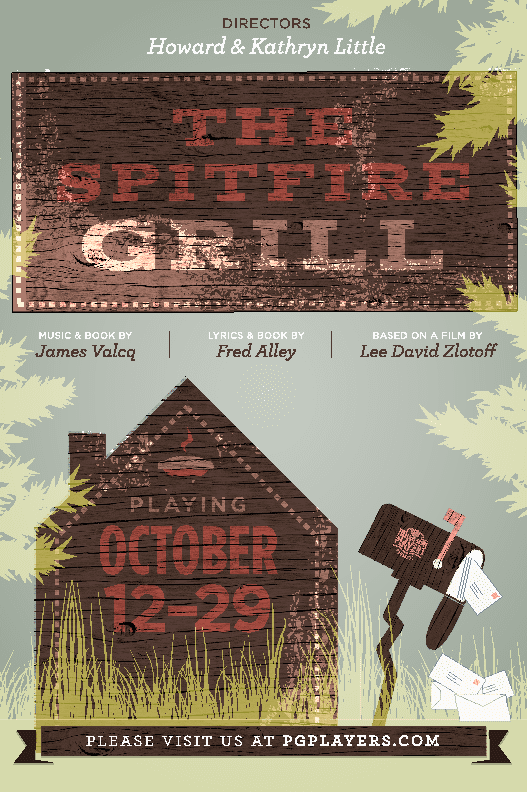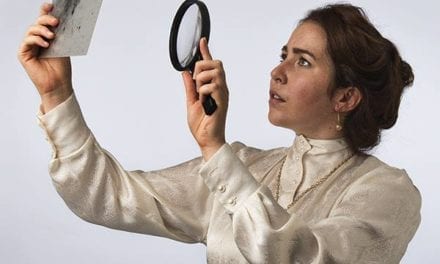PLEASANT GROVE — There’s a room in the basement of the Pleasant Grove library that’s been converted into a tiny theater. There are maybe eight rows of seats, the ceiling is about ten feet high, and the stage is probably wide enough to stand seven people along its edge. Kathryn and Howard Little have chosen the perfect little show to produce and direct in this little venue.

Show closes October 29, 2012.
The Spitfire Grill (music and book by James Valcq, lyrics and book by Fred Alley) is a down-home American musical about Percy Talbott, a young woman who chooses to live out her parole in the charmingly rural Gilead, Wisconsin. As Percy befriends (and be-enemies) the locals, she discovers that everyone harbors some secret desperate heartache, but no one is without hope of redemption.
This production had many strengths, the most notable being the cohesion of the cast and their collective ability to clearly tell a story. Each member of the cast knew the weight his or her character carried, and nobody tried to outshine, outact, or overshadow anyone else; they came together in a celebration of theatre to simply tell this very powerful story. The costumes (Luone Ingram), set (John Ellis), and sound design (uncredited) likewise simply told the story.
Another of this show’s enormous strengths was the individual character work. Each actor developed a distinct, believable persona, complete with history and relationships with the other characters. Tanika Little was almost flawless as Percy (I’ll get to the caveat later in the review). She presented the right kind of nervous-but-confident energy. Little was just tomboyish enough, and she managed a natural delivery of her comedic lines. Did I mention her vocals were absolute perfection? Even in “A Ring Around the Moon” when the stage was unlit, her voice gave me chills. I found myself believing in and rooting for Little from the very beginning.
Alex Lund as Percy’s parole officer and love interest, Sheriff Joe Sutter, exuded a natural cheerfulness and had such an easy stage presence that I could see why the battered Percy would begin to trust again through him. Plus, Lund and Little had great chemistry. The scene leading up to “This Wide Woods” was natural and playful, and graduated into the song seamlessly.
Luone Ingram played a delightfully prickly Hannah Ferguson. There’s a fine line between a cantankerous old woman who can’t be bothered and an otherwise affable old woman who has lost her joie de vivre. Ingram toed that line skillfully, and her transformation by the end of the show was much more believable for it. I was particularly touched by the reality of her heartache in “Forgotten Lullaby”—her regret, discouragement, loneliness, and guilt were evident—and “Way Back Home” had me in tears.
Kristen Leigh Metzger was a wonderfully understanding Shelby Thorpe (Percy’s friend and confidante). Metzger’s Shelby seemed like the kind of woman anyone would want as a friend–loyal, selfless, and easygoing. Her scenes with Percy were fun to watch, and her scenes with her husband were appropriately tense. But where Metzger really shone was in her songs. “When Hope Goes” was one of the highlights of the night—I was completely swept away in the story. It played out vividly in front of me, and I was only reminded that I was watching a show when the song ended and Metzger snapped back into the scene.
Jeff Thompson seemed like a less than promising Caleb Thorpe in the opening number. I was not sure I could believe that he would beat his wife (Shelby) or that he could harass Hannah (his aunt) and Percy. But overall, Thompson’s carefully crafted performance was one of the most effective of the evening. “Digging Stone” was a surprisingly powerful song, and it revealed to me everything about Thompson’s character that I hadn’t understood before. The scene after “Wild Bird” when he comes tearing into the Grill totally sloshed was dangerous; it built the tension leading up to the climax of the show, and it was some of the best drunk acting I’ve seen, to boot.
The simplicity of the staging was very effective because it allowed me to focus on the acting (and there was a lot of good acting). Unfortunately, because this production had nothing to hide behind, its flaws were magnified. If what I am about to say seems trivial, it’s because the rest of the show was so simple and well done that these few things pulled me abruptly out of the story.
The lighting design by Howard Little was inconsistent. For the first verse or two of “A Ring Around the Moon,” the stage was completely unlit, which I rather liked. For a moment, the entire action of the play was a voice from the darkness calling my attention to the words and the music instead of the set or the costumes. But after that brilliant moment, Little seemed afraid to use the same convention again. The bright light on the back porch had a different quality than the lights on stage, which I think was meant to represent the light of the moon. Instead, it looked like flood lights, and I didn’t understand why the characters out there couldn’t see each other. I would have preferred a lantern or a flashlight or something being the only light on the back porch. The set was almost film-like, so a few more seconds in semidarkness would have helped carry the reality established in the rest of the show into those porch scenes.
There is a lot of food in this show, but for some reason, the only food on stage was a bowl of cementish oatmeal and a bottle of booze (properties by Wendy Hope). There were no eggs that looked like Satan cooked them. There was no liquid in the coffee perc. There was nothing for Effy to sneer at or for Joe to choke down. Again, the set was almost film-like, and with so many direct references to the food in the script, I didn’t know why there wasn’t any food around.
There was one misdirection that might not have bothered anyone else, but which bugged me: Percy has been severely abused. She would not be so quick to let Joe (or any man) sit close to her or touch her arm or hold her hand. Having her be so comfortable with Joe right off the bat diminishes her potential transformation. After all, how powerful would it be if the first time the two of them touched was when Percy accepts Joe’s proposal?
The biggest problem I had with the show in general is that it was too nice. Everyone in it was too nice. Caleb only swung at Shelby one time, and she stood up to him. If she had cowered one time and stood up to him a second time, that would demonstrate more growth. The climax of the show is Percy’s redemption. In order for the audience to appreciate the soaring, sweeping release that is “Shine,” Percy must reach the depths of utter despair. “Wild Bird” was beautifully sung and acted by Metzger, but it didn’t have the impact it should have had because in the previous. I didn’t see enough contrast to appreciate the redemption, which meant the whole production felt a little fluffy—I was left wanting more, but not in the good way. There are plenty of opportunities, too, for a director to show Percy’s wounded nature, such as when she lashes out at Joe the first time he proposes, or when she thinks the visitor is a man who’s sneaking up on her. Percy is an inherently nice person who has a terrible past that weighs on her and turns her into something she doesn’t want to be. I needed to see more of that throughout the show.
These few weaknesses notwithstanding, The Spitfire Grill is a really good show. Go see it. It might not be the profound catharsis that Spitfire is meant to be, but it is an excellent little piece of theatre.
Note: this show contains language and subject matter that is not appropriate for small children.





